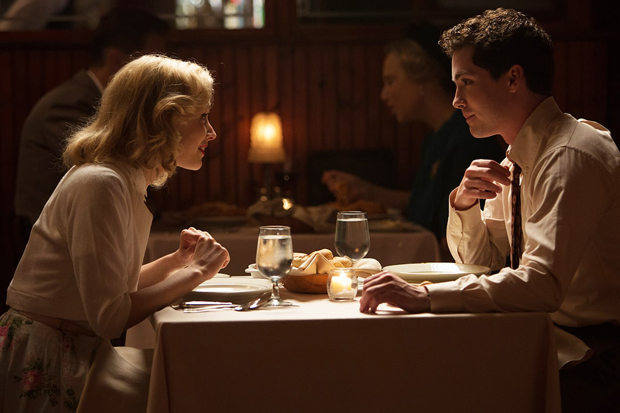Indignation is an adaptation of Philip Roth’s 2008 novel and amazingly, for an adaptation of a Philip Roth novel — see the recent dog’s dinner that was American Pastoral, for example — it may even be worth two hours of your time. (Depending on what you would otherwise be doing with that time; I wouldn’t wish for you to cancel that hip operation or similar.)
It stars Logan Lerman as Marcus Messner, a 19-year-old Jewish boy from Newark who, in 1951, escapes the Korean war and the over-anxious clutches of his parents by winning a scholarship to a college in Ohio. Marcus, at the outset, is a good Jewish boy — an exemplary Jewish boy. Marcus is the Jewish boy you would want if you happened to be in the market for a Jewish boy. He is super-bright, serious, a straight-A student. Marcus and his parents (his father is a butcher) are determined he will make it to law school, and there is no reason to imagine he won’t. But Ohio is an unknown quantity — ‘How will you keep kosher?’ asks his mother’s friend, worriedly. And it’s in Ohio that his life does, indeed, go awry, as the college’s conservative Christian values close in on him and he’s forced to feel the emotion for which the film’s title is absolutely the mot juste.
This is the directorial debut of James Schamus, who also penned the screenplay, and is otherwise a producer (Suffragette, Happiness, Brokeback Mountain, Sense and Sensibility) and writer (The Ice Storm, Crouching Tiger, Hidden Dragon, Eat Drink Man Woman) and if he doesn’t take out the rubbish or unstack the dishwasher, I put it to you: where would he find the time? Schamus conjures a compelling sense of dread — it feels ominous from the opening frame — and also captures the stifling, suffocating nature of a 1950s campus where girls are constrained by curfews, boys are strangled by buttoned-up shirts worn with ties, and regular chapel-going is mandatory for all, regardless.
Two encounters are pivotal for Marcus. One is with a fellow student Olivia (Sarah Gadon), with whom he becomes infatuated. She is a blonde shiksa goddess with a history of mental instability (uh-oh, here comes trouble) and who introduces him to both treif food and handjobs. (But not simultaneously, which would be super-messy; you’d need quite a clutch of napkins for that.) The other pivotal encounter is with the head of the college, Dean Caudwell (Tracy Letts), who is adversarial, prying and insinuating. ‘It says here your father is a kosher butcher,’ says the Dean, reading through Marcus’s file, in his presence. ‘No, it does not. I remember writing down just “butcher”,’ Marcus replies. ‘I’m merely assuming he is a kosher butcher.’ ‘He is, but it’s not what I wrote down.’ ‘I acknowledge that. But it’s not inaccurate to identify him more precisely as a kosher butcher…’ What is Caudwell’s game?
Caudwell’s game is anti-Semitism. That is, the kind of institutionalised, systemic anti-Semitism where hostility is never expressed directly, but thrums chillingly beneath the surface. Caudwell doesn’t wake up every morning consciously thinking of new ways to hate on Jews. (He isn’t like the RE teacher from my secondary comprehensive who referred to the few Jews in the school as ‘the Jesus killers’ and would turn to you mid-class to ask: ‘What does the Jesus killer think about this?’ Um …really sorry? Um …won’t happen again?) He thinks Christianity is good for everybody, and Jews can be accommodated so long as they attend chapel and toe the line. The most gripping section of the film is an 18-minute two-hander between Caudwell and Marcus which culminates in nice Marcus shedding his niceness. And also puking all over the Dean’s trophies. Riveting. (Not the puking: the to-and-fro between the two.)
Having never read this particular Roth, I can’t say how true this stays to the novel; can’t say whether it captures it’s complexities, nuances, depths, obsessions with sex and death and so on and so forth. I can only say that it bristles with a sexual energy and an emotional richness as well as, yes, indignation. It is also tremendously well served by a terrific cast. Letts is wonderful, of course, while Lerman exactly portrays a boy who is brilliant yet naive, morally righteous yet flawed. Further, there is a fabulous scene late on where Linda Emond, as Marcus’s mother, appraises Olivia (uh-oh, trouble) and extracts a promise from Marcus that will prove shattering. This is also riveting. And it doesn’t come with puking.
You could pick holes, so I will. For instance, Marcus offers a sporadic first-
person narration that feels like what it is — Roth’s prose spoken aloud — while Olivia seems horribly underwritten. What is her story? And I couldn’t tell you what it all adds up to. That the thrum of prejudice can destroy you? That fate is simply the sum of incidental happenings? Whatever, it’s still worth two hours of your time, but only depending on what else you have to do. (A hip will always come first.)
The post About a boy appeared first on The Spectator.
Got something to add? Join the discussion and comment below.
Get 10 issues for just $10
Subscribe to The Spectator Australia today for the next 10 magazine issues, plus full online access, for just $10.
You might disagree with half of it, but you’ll enjoy reading all of it. Try your first month for free, then just $2 a week for the remainder of your first year.














Comments
Don't miss out
Join the conversation with other Spectator Australia readers. Subscribe to leave a comment.
SUBSCRIBEAlready a subscriber? Log in